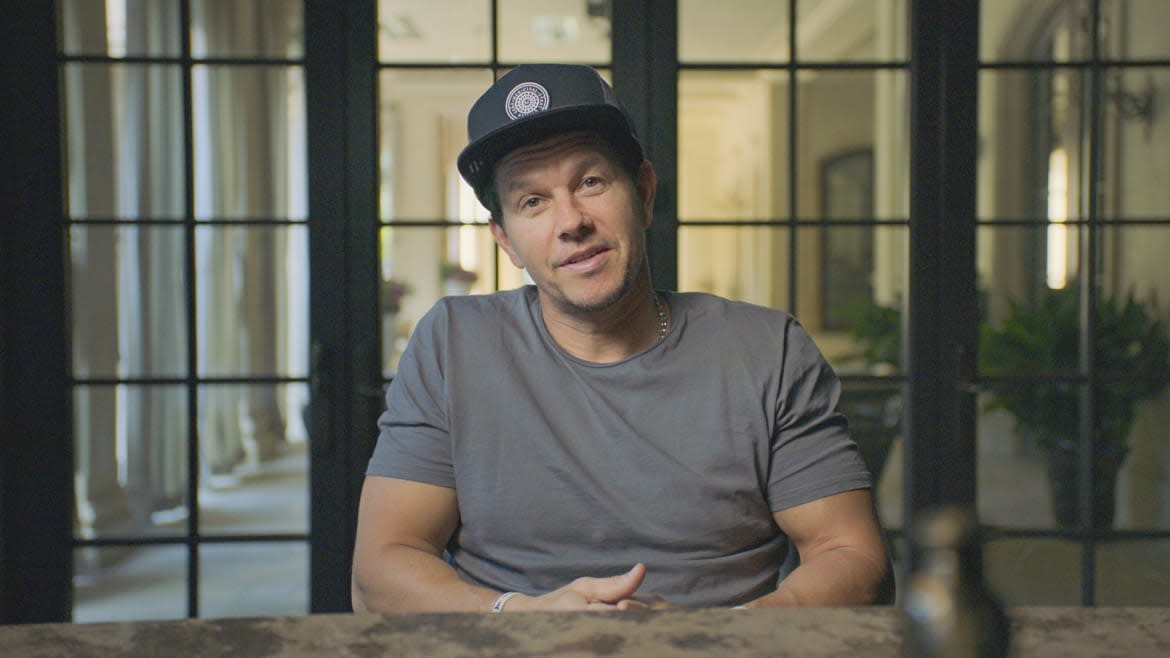Mark Wahlberg’s Reality Show ‘Wahl Street’ Is a Vanity Project on Steroids

- Oops!Something went wrong.Please try again later.
I cannot tell you the precise moment when Wahl Street, HBO Max’s new Mark Wahlberg reality show, broke my brain—but I’m pretty sure my soul left my body right around when someone sincerely uttered the words, “We’re elevating the henley.”
HBO Max’s new reality series zeroes in on Wahlberg’s many, many business pursuits—and, although this was not the intention when filming began, it documents all of these enterprises grinding to a halt due to COVID-19. But Wahl Street, produced by one of Wahlberg’s own companies, Unrealistic Ideas, is too close to its subject to offer any insight beyond what he wants viewers to see. (Obviously, the series makes no mention of the racist assaults Wahlberg committed as a teen, for which he apologized in a 2014 court filing seeking a pardon.)
Instead, six half-hour episodes feed viewers a cherry-picked narrative that seems to serve little purpose beyond stroking Wahlberg’s ego and convincing all of us that somehow his businesses—which include a fussy water company and a fitness supplement line—are, as he put it at one point, “chang[ing] people’s lives for the better.”
Michelle Williams Didn’t Deserve Equal Pay to Mark Wahlberg. She Deserved More.
Wahl Street seems determined to sell us all on the idea of Mark Wahlberg: Entrepreneur, but mostly it just reveals that perhaps the indefatigable Bostonian at its center really could use a nap. In addition to his prolific career as an actor, Wahlberg is invested in eight businesses: Closest to the Hole Productions (a studio whose slate includes Boardwalk Empire and Lone Survivor); fitness water company (I know) AQUAhydrate; fitness supplement line Performance Inspired; gym franchise F45; clothing line Municipal (responsible for elevating henley shirts as we know them, apparently); Mark Wahlberg Automotive Group; fast-casual chain Wahlburgers; and the unscripted production shingle Unrealistic Ideas. Wahlberg also mulls over investing in another venture: convenience store chain Green Zebra.
Throughout the series we see the former frontman of the Funky Bunch flying across the world, taking meetings for various businesses on set, and, once the pandemic hits, sinking into that oh-so-familiar Zoom vortex. We see him working out a lot, in scenes that reveal Wahlberg is definitely that guy who won’t stop grunting loudly at the gym. And in slower moments, the actor coaches his kids on entrepreneurship and relaxes as his daughter paints his nails. (He also has an ongoing beef with the family dog, Champ, who just can’t stop defecating in inappropriate places.)
But much like Wahlberg’s portfolio amid the pandemic, this series is a mess.
The one thing Wahl Street seems to want us to understand is that Wahlberg is good at business—or at least, that he’s on the right track. A Greek Orthodox priest and hedge fund manager the actor befriended notes with awe that the actor read all 10 books he recommended to him, and episodes often punctuate various meetings Wahlberg has taken with talking-head interviews in which business titans including former Disney CEO Michael Eisner, UFC President Dana White, and FUBU founder Daymond John gush about a business fundamental that Wahlberg just demonstrated. Unfortunately, their advice is often so condescending that it borders on actually insulting.
A sample: “Here’s something I think a lot of people don’t get,” ActOne Group founder Janice Bryant Howroyd says. “Success is transferrable. You can be highly successful in one industry and transfer it to a different industry, as long as you’re willing to put the work in and honor what you don’t know.”
In other words: If you can make a lot of money in one business, you can invest it in another, and probably find someone to help check your work. Groundbreaking!
In other moments, however, Wahl Street seems determined to paint Wahlberg as a confused underdog. The series adopts a strange gambit of rolling clips from Wahlberg’s film catalogue—particularly older action roles—to act as something like a running commentary slash interior monologue. Often, these play as Wahlberg sits in a mind-numbing meeting or faces a major business obstacle; they depict the actor in peril, overwhelmed by something he cannot understand or control.
As the episodes wear on, the clips feel less and less related to what’s actually transpiring—but even from the beginning, it’s a clunky device that serves basically no purpose.
Wahl Street also declines to grant viewers a comprehensive profile of Wahlberg’s many business investments. As eager as I was to learn more about the fitness water company, for example, we never hear about it again after the first mention. The series is similarly uninterested in providing any specific figures—which makes the stakes of the entire production somewhat difficult to grasp.
“You know why this show is gonna be such a hit?” Wahlberg says in the finale, as he grasps the havoc COVID-19 has wreaked on his businesses and the series meant to capture them. “’Cause it’s a fucking shitshow. It’s fucking disastrous. I mean, holy shit. People are gonna love watching me just fucking implode.”
The moment is meant to drive home how severe the toll on Wahlberg and his portfolio has been. But at the end of the day, we all know Wahlberg won’t implode; come what may, he and his family will probably be fine financially.
The real trouble with Wahl Street is that it has almost nothing to say about Mark Wahlberg or about business that we haven’t heard before. It’s a drooling love letter to the idea of “rise and grind” that, after a year of COVID-induced burnout, feels out of touch. And if it taught me anything, it’s simply that Mark Wahlberg and his many interconnected investments exist for little reason beyond pitching us all more Mark Wahlberg.
Get our top stories in your inbox every day. Sign up now!
Daily Beast Membership: Beast Inside goes deeper on the stories that matter to you. Learn more.

